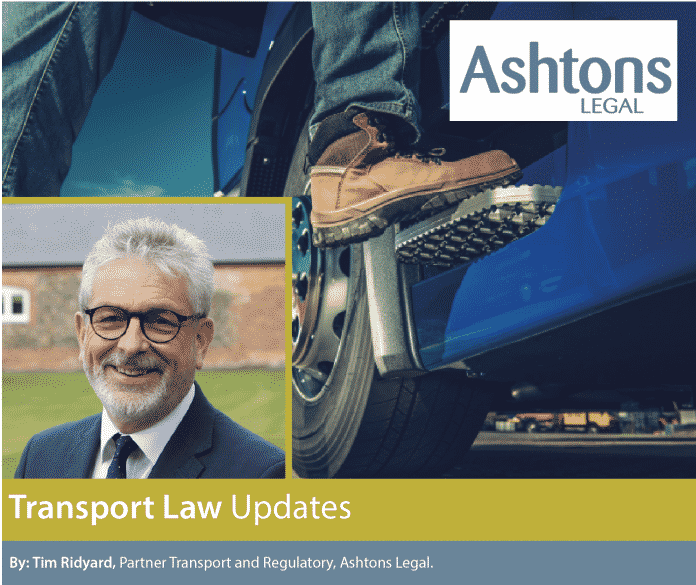By: Tim Ridyard, Partner – Ashtons Legal
As a result of the current health crisis operators and drivers are having rapidly to adjust. There are problems and challenges that would not occur ‘in normal times’, writes Tim Ridyard of Ashtons Legal solicitors. What if you cannot get your vehicle serviced as your maintenance provider is unavailable? What to do if a Driver’s DQC expires and they cannot get further training? What if a driver needs a medical to retain the driving licence entitlements? What if drivers may be ill and/or be self-isolating so new ones may need to be sourced from elsewhere?
A number of necessary steps and new approaches are having to be taken by DVSA, DVLA and the DfT to assist to keep fleets operating whilst also seeking to protect the health of everyone.
Things are moving fast so expect further and frequent announcements about various problem areas such as Driver CPC and driver medicals, for example.
Where there are relaxations or extensions of due dates all guidance emphasises that safety standards must always still be maintained; vehicles must be safe and drivers must not be tired. Here is a brief overview of some key areas:
Annual test for HGVs, trailers and PSVs
There is an automatic 3-month time extension, save in four categories: any vehicle needing its first test before 31 March 2020; any vehicle or trailer being put back in service where the test certificate expired before March 2020; a PSV with an MOT expiring in March 2020 & vehicles needing a dangerous goods (ADR) test before 31 March 2020. For Guidance on applying for extensions click here. NB there is now also in force a 6-month extension for cars and vans. There the vehicle’s MOT expiry date extends automatically if the due date is after 30 March 2020. However, any vehicle must be safe to drive.
Operator licensing
The Senior Traffic Commissioner has issued Contingency and Emergency Planning Guidance covering periods of grace, operating centres, financial standing, transport managers, interim licences, temporary goods exemptions, bus registrations and community transport.
In addition to this, an Advice document from the Traffic Commissioners was published on 20th March 2020. A lot of important information is contained here, such as how to deal with applying for ‘periods of grace’ where financial issues may arise or what to do if an operating centre may become unavailable.
Suspension of driving tests for all vehicles
Theory tests and practical driving tests stand suspended to ‘help prevent the spread of coronavirus’. This is up to and including 20 April 2020 for theory tests and for up to 3 months for driving tests. It applies to all types of theory tests, driving tests and approved driving instructor (ADI) standards checks.
NB there is provision for emergency tests for critical workers if your work is critical to the COVID-19 response, or you work in a critical sector. These include health and social care; education and childcare; key public services; local and national government; food and other necessary goods; public safety and national security; transport; utilities, communication, and financial services.
Drivers’ hours’ rules/working time
Relaxation of EU/GB drivers hours rules has now been extended to all sectors and journeys through the Temporary relaxation of the enforcement of the drivers’ hours rules: this is for ‘all sectors carriage of goods by road’ and started on Monday 23 March 2020 running until 23:59 on Tuesday 21 April 2020 (unless varied or extended). The temporary exemption above runs alongside other relaxations already in force: delivery of essential items to retailers – delivery of essential items to consumers – trunking delivery of LPG.
There are specific exemptions relating to daily/weekly driving limits, breaks and daily/weekly rest periods. Operators and drivers can only apply the relaxations if they truly necessary and other supply chain solutions cannot be found. Further, drivers must endorse the application of the relaxations on charts or digital printouts, as they would under Article 12 now where they could not unavoidably comply with the rest/driving rules.
Operator compliance
COVID-19 is going to create further and ongoing practical problems, For example, it may not be possible to have maintenance inspections/brake testing on time. (NB there is specific provision for extending inspection intervals in some sectors in the Advice document from the Traffic Commissioners. It may be necessary to change the maintenance provider or take maintenance in-house. It may well be that some businesses change their maintenance intervals given reduced mileages being driven and vehicles being stood up for some time.
The general advice is to keep good records to positively demonstrate decisions made and why. When making decisions are made every attempt must be made to comply with the current law but if an alternative solution has to be found safety must not be compromised. Op0erators should remember to update changes on the online VOL system.
DVSA enforcement
All Government agencies will be affected by restrictions caused by COVID-19. DVSA will not be able to conduct site visits and reduce other types of activity. We envisage that this may trigger greater use of desk-based assessments via the Remote Enforcement Office (REO) system where operators are obliged to provide information, data, and records to DVSA instead of being visited by DVSA examiners. Such assessments need to be taken seriously and comprehensive information needs to be provided. Problems arising invariably arise from not carrying out this procedure correctly.
Relaxation of the EU rules:
‘For the drivers and work in question, the EU drivers’ hours rules can be temporarily relaxed as follows:
- Replacement of the EU daily driving limit of nine hours with one of 11 hours*
- Reduction of the daily rest requirements from 11 to nine hours
- Lifting the weekly (56 hours) and fortnightly driving limits (90 hours) to 60 and 96 hours respectively
- Postponement of the requirement to start a weekly rest period after six-24 hours periods, for after seven 24 hours period; although two regular weekly rest periods or a regular and a reduced weekly rest period will still be required within a fortnight*
- The requirements for daily breaks of 45 minutes after 4.5 hours driving replaced with a break of 45 minutes after 5.5 hours of driving.
*Drivers’ must not use relaxation these two at the same time. This is to ensure drivers are able to get adequate rest.’
Tim Ridyard is a Road Transport Regulatory solicitor and partner at Ashtons Legal www.ashtonstransport.co.uk





